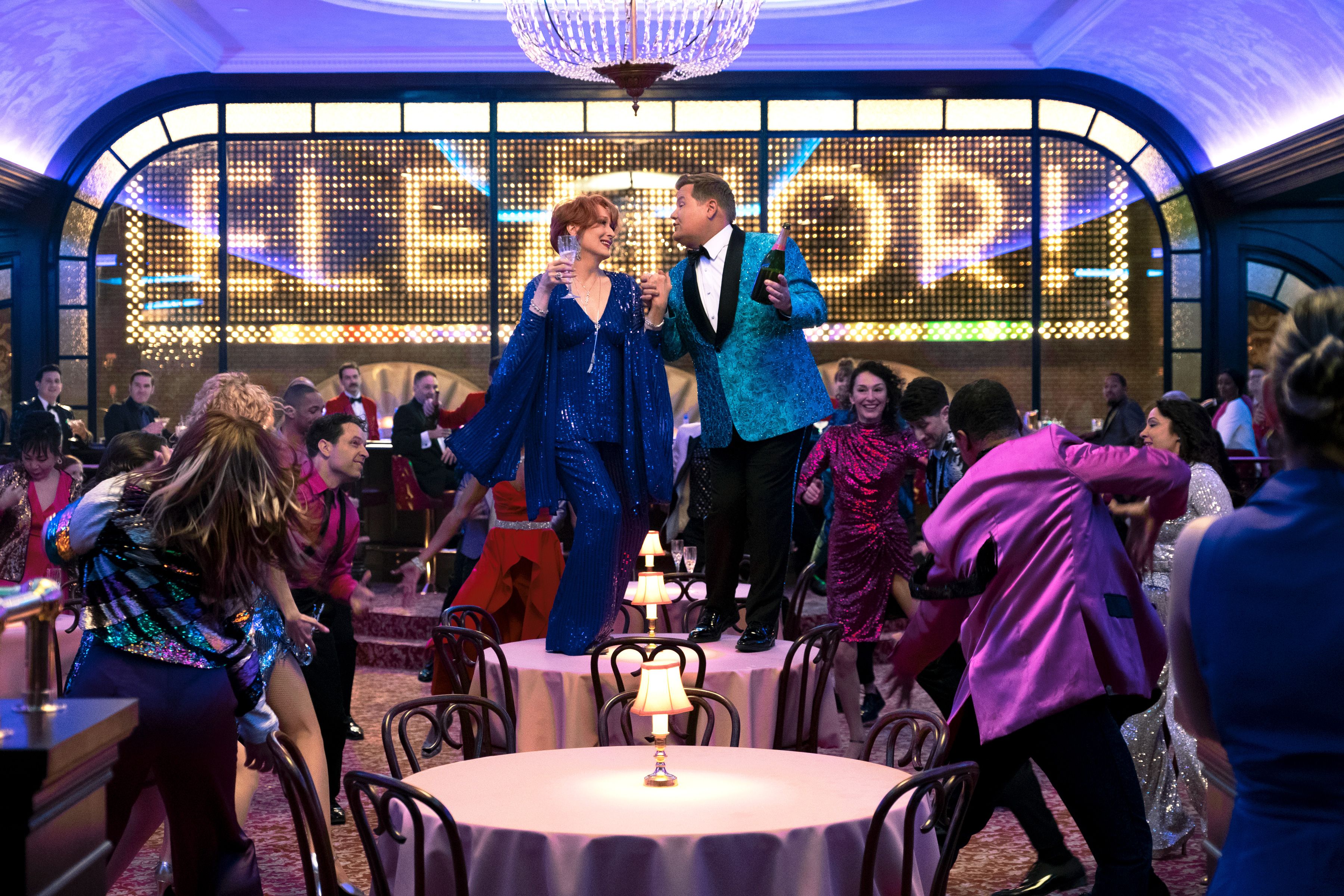A musical! A musical’s the thing! A glitzy, upbeat production full of elaborate dance numbers and positive vibes—that’s the cure for the 2020 blues. Well, that and a vaccine, but our hearts need a cure too. How kind of Glee creator Ryan Murphy, then, to take time out of the litany of shows he’s running—American Horror Story, American Crime Story, 9-1-1, Pose, The Politician, 9-1-1: Lone Star, and Ratched, to name them all—and give his undivided attention to The Prom, the movie musical event of the year. Nothing’s more healing than going back to high school!
The Prom, based on the Broadway musical of the same name, is a natural fit for Ryan Murphy, who’s made a career out of putting marginalized people both center stage and behind the camera. The plot follows Emma Nolan, a lesbian high school student who accidentally incites a schoolwide controversy: when word gets out that she’s planning to bring her girlfriend to prom, the conservative and weirdly powerful parent-teacher association cancels prom altogether, circumventing the legal repercussions of banning a single student. As harsh as that sounds, it actually happened—in 2010, a Mississippi schoolboard canceled prom after catching wind of a student’s plan to attend with her girlfriend, garnering nationwide attention in the process. Local parents appeared to cave to the pressure when they revived the prom, but that turned out to be a ruse set up to distract the lesbian student while straight kids threw a secret dance elsewhere. Awful, right? At least the story had a happy ending: the band Green Day helped fund a “second chance prom” in Mississippi that queer kids from all over the state attended.
The Prom sticks to the true story pretty closely, sans an appearance from Green Day, who apparently aren’t Broadway bankable post-American Idiot. Instead, the movie makes protagonists out of four fictional Broadway stars—played by Meryl Streep, Nicole Kidman, James Corden, and Andrew Rannells—who go looking for a cause to support after their public image takes a hit. Their introduction makes it immediately clear that The Prom is a Ryan Murphy production, if the oversaturated color grading didn’t give it away: Murphy may be a champion of inclusivity, but his television work begs the question of what he’s including people in, as his progressive-on-the-surface programs are known for devolving into parades of hack writing that dishonor the very people Murphy meant to spotlight. The quartet of Broadway faux activists raise this red flag within minutes.
Their goal is to maintain their selfish lifestyles while appearing to be good people—which one of them says out loud to unanimous agreement, so that’s any semblance of real human beings out the window. They aren’t insufferable snobs; they’re caricatures of insufferable snobs, which means there’s nothing to suggest they’re capable of growing or changing or giving us a reason to want to be around them (until the plot demands their magical discovery of empathy, like rich Grinches hearing Christmas carols for the first time). Watching Streep and Kidman play caricatures can be fun when they go big with their Broadway stereotypes, but Corden’s performance is too tangled up in harmful stereotypes of gay men to be anything but, well, insufferable. The fact that the Broadway stars have more screen time and dialogue than Emma, who’s supposed to be the heart of the story, is a massive, massive miscalculation.
The whole movie is a miscalculation, really. It wants to be a sugar rush of pure optimism and a tale of overcoming hate, but the latter requires something other than sugar-rush optimism to work in the slightest. When the Broadway stars show up and the school principal says that it’s good to see Emma smile again, there’s no sense of relief, because Emma had been taking her peers’ homophobia in stride and smiling unflappably through every previous scene. If the negative emotions don’t ring true, then neither can the positive ones that are supposed to defeat them. This problem never goes away. One minute, The Prom is calling Bible Belt Americans a bunch of incestuous hick bigots, the next, these same bigots are dancing to promposal musical numbers in the hallways. Virulent homophobes politely use the world “homosexual” while discussing how to ruin a gay teenager’s life. Everything is at odds with itself and nothing works.
The music isn’t great either. None of the songs are earworms. I suspect that’s because they lack memorable melodies or refrains, with the exception of the Kidman number “Zazz”, which is memorable because the phrase “give it some zazz” is repeated over and over. That’s what it has over every other song in this musical. There’s not even a sense of visual wonder, which you can practically buy these days—Murphy doesn’t have an acute grasp on what works differently between live and filmed musicals, so we mostly get hollow echoes of what The Prom would look like on stage, plus flashing lights that very well could’ve been added in post. I can scarcely imagine wasting Matthew Libatíque, one of the most talented cinematographers of the generation, on this rubbish.
Only the sight of queer kids rushing into the “second chance prom” has any power, by virtue of seeing underrepresented people fill up every corner of the screen. But it’s reminiscent of seeing all the MCU’s superwomen band together in Avengers: Endgame after the franchise kept them at the margins for years—after the surprise wears off, you start to wonder whether this kind of representation is in good faith at all.
★ (1/5)




